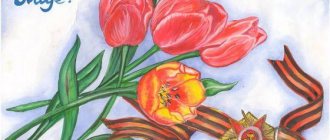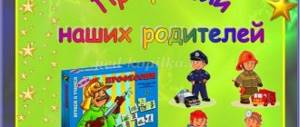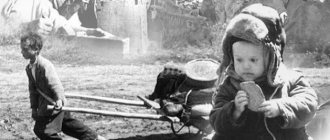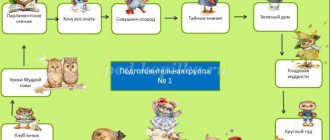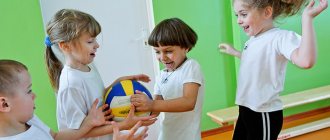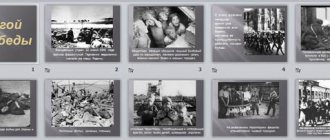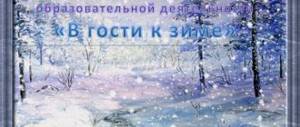Project in the senior group of kindergarten “For children about the Great Patriotic War”
PROJECT for children of senior preschool age for May 9 - Victory Day: “CHILDREN ABOUT WAR”
Direction of the project:
natural - scientific
Type of project:
creative, group, short-term.
Relevance:
Patriotic feeling does not arise on its own.
This is the result of a long, purposeful educational influence on a person, starting from childhood. In this regard, the problem of moral and patriotic education of preschool children becomes one of the most pressing. As a result of systematic, targeted educational work, elements of citizenship and patriotism can be formed in children. You cannot be a patriot without feeling a personal connection with your Motherland, without knowing how our ancestors, our fathers and grandfathers loved, cherished and defended it. We should also not forget that war is one of the most important historical experiences and practices in the formation, reproduction, education and perception of a real man. The image of the warrior remains one of the key symbols of masculinity. This is especially important for modern children. For normal development, boys and girls need the vague image of a real man to gradually become a reality, finding its embodiment in specific people. That is why we considered it necessary to highlight for children the feat of our people during the Great Patriotic War. Problem:
the modern generation knows nothing about the Great Patriotic War.
The goal of the project:
to educate children of senior preschool age with moral and patriotic qualities and a sense of pride in their homeland.
Project objectives:
expand and systematize children’s knowledge about the Second World War.
to form moral and patriotic qualities: courage, courage, desire to defend one’s homeland. encourage children to show interest in the history of their country. instill in children a respectful attitude towards the older generation. careful attitude to family photographs and awards, Project participants: children of the senior group, parents, teachers. Project duration:
3 months.
Project implementation period:
February, March, April.
The main forms of project implementation:
excursions; GCD, conversations; viewing presentations about the war; mini-exhibitions; consultations for parents.
Project implementation stages:
Preparatory stage (informational - cumulative, organizational) collection of literature on this topic; drawing up a work plan; development of the content of a conversation project on the topics: “The Great Patriotic War”, “Why the war is called the Great Patriotic War”. The main stage (practical) reading works of fiction: - S. Alekseev “From Moscow to Berlin”, - poems and stories about the Great Patriotic War “Victory will be ours”, - S. Alekseev “From Moscow to Berlin”, - K. Paustovsky “The Adventures of the Rhinoceros Beetle” - N. Khoza “The Road of Life” - V.N. Sementsova “Ficus Leaf” listening to musical works about the war: - “Victory Day” by D. Tukhmanov, - “Cranes” - “Holy War” lyrics. V. Lebedeva-Kumacha, - “Katyusha” by M. Blanter, - V. Alkina “Farewell of a Slavic woman”, conversations with children on the topics: “Children and war”, “Feats of children - war heroes” (from the series “Children of War”) ; "Holiday. Victory Day"; thematic classes on the topics: “Children about the war”, “Victory Day”, etc. The story of the great-grandfather, one of the pupils, Melnik Ivan Ivanovich, about the difficult years of the war. Show children presentations on the topics: “Children are heroes”, “Heroes of the Second World War”, “We are proud of you”. Consultation for parents: “How to tell your child about the war?” Exhibition design: “Thank you for winning!” (military uniform, photographs, photo albums of brothers, fathers, grandfathers, great-grandfathers who served in the armed forces of the Soviet and Russian armies), (responsible parents of pupils and educators). Carrying out the physical education festival “Zarnitsa” (participants: children, parents) Exhibition of handicrafts dedicated to the Second World War. Excursion: to the eternal flame, monument to G.E. Sobyanin, laying flowers to the fallen heroes of the Second World War. excursion to the village library. Productive activities with children on the topic: “Technology of the war years,” making holiday cards for veterans and home front workers. Final stage (summarizing): GCD on the topic: “What do I know about war?” defending a project in kindergarten; an exhibition of crafts (together with parents) on the theme: “In memory of the war”; creation of the album “You are our pride” - war participants and home front workers in the Second World War in our village; Expected result of the project: 1. Children's knowledge about the Great Patriotic War has been expanded. 2. The skills of productive activities were consolidated when creating and designing the album “You are our pride.” 3. A respectful attitude has been formed towards war participants, home front workers, and careful attitude towards family photographs and relics (medals, orders, etc.). 4. Continue to develop the moral and patriotic qualities of students. Product of project activity Creation and design of the album “You are our pride” - war participants and home front workers in the Second World War in the village of Igrim
Summary of the thematic lesson in the senior group “Children about the war”
Goal: To acquaint children with the military awards that were awarded to soldiers during the Great Patriotic War, with the Victory Banner that was hoisted over the Reichstag;
to cultivate respect for the military exploits of fighters and commanders, pride in one’s people, and love for the Motherland. Equipment : collection of stories “Children - Heroes of the Great Patriotic War”;
stand with photographs of orders and medals; image of the Victory Banner, visual didactic guide “The Great Patriotic War in the Works of Artists” (Mosaika-Sintez publishing house), reproductions of paintings by O. Ponomarenko “Victory”, V. Bogatkin “Storm of the Reichstag”, musical recordings of songs from the times of the Great Patriotic War. Progress of the lesson:
1. Organizational moment At the beginning of the lesson, we listen to a fragment of the song “Victory Day” (music by D. Tukhmanov). Educator: What holiday is this song talking about? (This holiday is called Victory Day.) What kind of victory was this? (It was a victory in the war.) What is this war called? (This war is called the “Great Patriotic War.”) What do you think the word “fatherland” means? (The country in which we were born and live. The country of our parents - fathers and mothers and our ancestors. Our homeland is Russia.) 2. Learning new material Educator: Children, soon our country will celebrate the Victory Day. On this day, on the streets of the city you can meet veterans - warriors of that distant war. The May holiday - Victory Day - is celebrated by the whole country. Our grandfathers wear them. Military orders. Today we will see awards - orders and medals that were awarded to soldiers during the Great Patriotic War. (Looking at photographs with orders.) Educator: The Great Patriotic War lasted four and a half years. It brought a lot of troubles and grief to the Russian people - many cities and villages were turned into ruins, thousands of people died. Defending their homeland, soldiers and commanders fought without sparing their lives. Educator: Why do you think a warrior could receive an order or medal? In the first years of the war, fighters and commanders were awarded the Order of the Red Banner, the Red Star, medals “For Courage”, “For Military Merit”. (Look at the illustrations.) During the battles, it was necessary to highlight the exploits of the fighters and celebrate the art of military leaders. Then the Orders of the Patriotic War, Suvorov, Kutuzov, Alexander Nevsky and others were approved. Special medals “For the Defense of Leningrad”, “For the Defense of Sevastopol”, “For the Defense of Moscow” were made for the valiant defenders of the hero cities. Even children were awarded orders and medals (photos of children). Educator: Guys, do you think awards were given only at the front? And those people who worked in the rear also performed feats? Were there any female heroines among the defenders of the Fatherland? Today we have learned a lot about the awards that were used to honor heroes during the Great Patriotic War. We will preserve the memory of these people forever. 3. View the presentation
• Victory Day is one of the most revered holidays in our country. MAY 9, 1945 is moving further and further away from us, but we still remember at what cost this victory was achieved for our people. • It is on MAY 9 that all residents of our vast country celebrate the great holiday Victory Day. On this day, military parades are held in all cities, flowers are laid at the Tomb of the Unknown Soldier, veterans are congratulated, and festive fireworks are given. (Slide 1-2). • But why are the veterans, participants in that great war, so sad, why do tears blur their eyes? What do they remember on this day? What kind of war was this? At what cost did our people get the victory? (Slide 3). • Our story today will be about that great war. This was when our country Russia was called the USSR, when your great-grandmothers and great-grandfathers were young, beautiful, full of strength. They were happy, dreamed about the future, thought that everything would be fine in their lives. But their dreams did not come true. • A terrible force has appeared in the world - fascism. The tank tracks began to grind and bullets whistled. Step by step, the Nazis captured one country after another, destroyed cities, blew up monuments, robbed and killed people. And we were getting closer and closer to our Motherland. (Slide 4). • On June 22, 1941, without declaring war, the Nazis attacked our Motherland. Bombs fell, enemy soldiers set foot on our Earth, and the Great Fatherland War began. (Slide 5). • All residents of our country took up arms and stood up to defend our Motherland. (Slide 6) - song “Holy War”. • The enemy was very strong. It was difficult for our soldiers. The soldiers of our army beat the enemy in the air, on water and on land and drove him from the vastness of our land. The battles took place both in the summer heat and in the winter cold. They fought along with men (Slide 7-8-9). • Children had the hardest time during the war. Kindergartens and schools did not work. Many children were left completely alone, their parents died. And some boys became “sons of the regiments,” their hungry and unhappy ones were taken in by the soldiers, and the children went into battle with them, fighting very bravely. The war taught children not to cry. The children clearly learned their lesson - if you cry, they will shoot you. The weight of military adversities and disasters fell on their fragile shoulders. (Slide 10, 11, 12). And they really dreamed of a peaceful life. Poem "I'm playing with soldiers." • And in the far rear, women and children worked in military factories, made airplanes, weapons, shells, dug trenches, tried to help their fathers, sons, husbands, and the front. (Slide 13, 14). • But no matter how hard it was for our people at the front and in the rear, there was always time for music and songs. It was music that raised the morale of our soldiers and led them into battle; it was songs that added strength and raised the morale of our people. (Slide 15). Chatushki, song “Katyusha”. • This bloody war lasted for four long years. During this time, a huge number of not only soldiers, but also civilians died. (Slide 16-17). • And then this long-awaited day came - MAY 9, 1945. On this day the war ended. Our troops defeated the fascists not only on the territory of our country, but also liberated residents of other countries. (Slide 18). Our soldiers performed many feats during the Second World War. Poem by G. Rublev “It was in May...”
• The whole country rejoiced at the victory, but this joy was with tears in its eyes, because in every family, in every home, someone died in this terrible war. Every year people bring flowers to the monuments of the defenders of our Motherland, to the Tomb of the Unknown Soldier. Poem “Victory Day” No one will ever forget the feat of our people during the Great Patriotic War. Song "Victory Day". 4. Physical education 5. Consolidation of new material Q: To preserve the memory of war heroes, monuments have been erected in cities and towns. At the Kremlin wall in the capital of our Motherland, the hero city of Moscow, at the Tomb of the Unknown Soldier, the Eternal Flame burns. This is the fire of our memory, a symbol of what we remember about those events. There is another very important symbol - the Victory Banner. Educator: Let's look at the image of the Victory Banner. What color is the Victory banner? (The Victory Banner is red.) What is depicted on the banner? (The Victory Banner depicts: a star, a sickle and a hammer, inscriptions.) In those days, our country Russia was part of a state called the Union of Soviet Socialist Republics. The national flag of the Soviet Union was red with a gold star and a gold hammer and sickle. The hammer and sickle are symbols of labor and workers, those who work in factories and factories, grow grain, the star is a symbol of the defenders of the Fatherland. These symbols are also depicted on the Victory Banner, only they are painted on the panel with white paint. The inscriptions on the Victory Banner indicate which military unit this banner belonged to. Events related to the Victory Banner took place at the very end of the Great Patriotic War. And before that, in difficult battles, Soviet troops liberated their homeland from cruel invaders. They liberated many other countries: Poland, Czechoslovakia, Hungary, Austria, and finally took the capital of Nazi Germany, the city of Berlin, by storm. In the center of the city, battles broke out for every house, for every street. The storming of the fascist government building, the Reichstag, was especially difficult. To overcome the stubborn resistance of the Nazis, we had to fight for every floor, for every room. And finally, assault groups of Soviet soldiers climbed to the roof. The Victory Banner fluttered over Berlin - this meant that the war was over and the long-awaited victory had been won. Then the Victory Banner was transported to Moscow to participate in the Victory Parade. 6. Reflection I propose to draw the Victory Banner. The song "Dark Night" is playing
We recommend watching:
Summary of a lesson in the senior group on the topic: Victory Day - May 9. Educational project on moral and patriotic education in kindergarten. Senior group Project in the preparatory group of the kindergarten “For children about the Great Patriotic War” Project for Victory Day in kindergarten. Senior preschool age
Similar articles:
Scenarios for May 9 in kindergarten. Senior - preparatory group
